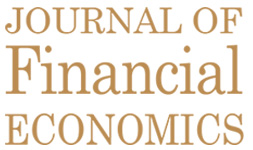

| Journal of Financial Economics Disclosure Policy |
|---|
Authors who submit to the Journal of Financial Economics ( JFE ) should:• State every source of financial support for the research described in the paper. Each author should identify every interested party from whom he or she has received significant financial support, summing to at least $5,000 in the past three years or that will exceed this threshold under contracts in place at the time of submission. Support includes financial support (e.g., consulting fees, retainers, grants, research support, equity shares or stock options, and the like), and in-kind support (e.g., access to data). An interested party is any individual, group, organization, or business entity whose self-interest, whether financial, political, regulatory, or some other form, will be or could have been directly affected by the article. • Each author should disclose all paid or unpaid positions as an officer, director, corporate advisor, or board member of relevant non-profit organizations or profit-making entities. A “relevant” organization is one whose policy positions, goals, or financial interests relate to the article. • Each author must disclose if another party had the right to review the paper prior to its circulation. • If any support provided to an author by an interested party is subject to any non-disclosure obligation, this fact must be disclosed to the JFE along with the nature of the conflict. • Any submitted article reporting research that involves the collection of data on human subjects must disclose whether the author obtained approval for such data collection from an Institutional Review Board (“IRB”). If IRB approval was not obtained, the author must state the reason. When submitting a paper, each author should prepare a separate page titled “Disclosure Statement” and place it following the cover page of their submission. The disclosure statement should be included even if authors have nothing to disclose. At the time of submission, only the editor will have access to the disclosure statement (since the JFE uses a double-blind review process). For papers accepted for publication, disclosure will take two forms: • If the disclosure statement is brief, it should be included in the “acknowledgments” footnote. • If the disclosure statement is longer, then disclosure should have two parts: • a brief statement summarizing potential conflicts of interest that will be included in the “acknowledgments” footnote, • a more detailed description of the activities and relationships that are the source of a potential conflict of interest. An electronic version of the disclosure statement which will be archived on the JFE web site. Failure to disclose relevant information when the paper is first submitted could result in termination of the review process or reversal of an acceptance decision. If the paper is already published, the JFE reserves the right to post a notice on the JFE web site and in its printed version notifying readers that the authors of the paper violated the JFE disclosure policy. This policy is available in PDF format here. |